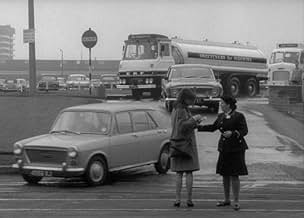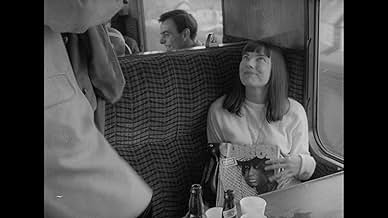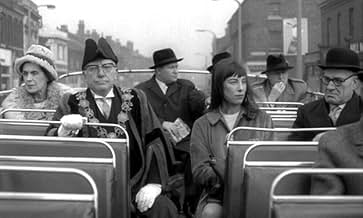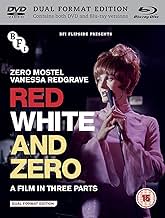Füge eine Handlung in deiner Sprache hinzuAn impassive young girl is taken from her suicidal big-city life back to a city in the North of England on a bizarre bus trip. Seen through the poetic eye of the camera, this is a commentary... Alles lesenAn impassive young girl is taken from her suicidal big-city life back to a city in the North of England on a bizarre bus trip. Seen through the poetic eye of the camera, this is a commentary of doomed British morbidity.An impassive young girl is taken from her suicidal big-city life back to a city in the North of England on a bizarre bus trip. Seen through the poetic eye of the camera, this is a commentary of doomed British morbidity.
Allan O'Keefe
- Supporter
- (as Alan O'Keefe)
Dennis Alaba Peters
- Mr. Wombe
- (as Alaba Peters)
Empfohlene Bewertungen
This is a rather confusing situation in that generally it is held that Red White and Zero was a three part film with the involvement of Peter Brook, Lindsay Anderson and Tony Richardson as directors with only Anderson's White Bus segment being completed. Yet here we have a BFI release claiming discovery of the completed portmanteau film yet there are clearly three senate films complete with individual credits. Be all that as may be the Brook segment featuring Zero Mostel is a very 60s slapstick/surreal effort that barely succeeds and the luscious looking short film featuring Vanessa Redgrave (sort of) singing and cavorting about is not terrible but cries out for the participation of Jeanne Moreau, for whom it was originally intended, before Richardson switched ladies. The White Bus remains the most competent and fine looking film displaying the wonders of industrial Manchester in a jokey visitor tour that ironically probably does take place today. As might be expected, as well as the splendid photography we get social comment and politics mixed in with a fondness for the English rural landscape and a humane picture of life of the common man (or woman as rather surprisingly here presented).
Interesting 47 minute short from a Shelagh Delaney short story. A girl quits her dull job, and goes on a surrealistic bus tour of a dilapidated Manchester. Along for the ride are a strange mix, including a lascivious vicar, lord mayor (Arthur Lowe, always great), etc. Many of the techniques that became part of 'If' and 'O Lucky Man' first show up here.(e.g. mixing color and B+W). It also follows 'O Lucky Man' in being a surreal journey of a somewhat passive, young lead character traveling through a world where they have little power. Enigmatic, sure, but it's interesting and entertaining in a Brechtian/Anderson sort of dark humored politically satirical way. Cleary it's making fun of the pathetic nature of modern society and our desperate need to justify all the glories of 'progress that really sap our humanity. Some terrific and haunting images. Anthony Hopkins appears very briefly singing in German (?!?).
I can't believe people liked this. This was obviously made by some young person who hates society. Sadly this ass clown probably grew up to be some politician who is running things now. Idiots.
When I think about The White Bus, I think about how thoughts and ambiance spontaneously go on, because they do here just as they do in a person's mind. When I caught myself, during and after watching it, trying to pigeonhole whether it was supposed to be a hallucination, pure free association or a stream of consciousness, I hearkened back to my first experience seeing a movie directed by Lindsay Anderson, If
., which was a more realistic story, yes, but had a dreamlike lack of reason or cohesion for its stylistic and visual changeovers. Likewise, The White Bus is just a chain of imagery. But what makes it a consistent piece? Somehow, it is. Because I followed it and enjoyed it.
Maybe that goes to show that "invisible style," the avoidance of indulgent cinematography because a movie exposing itself diverts from the story, is not limited to the traditional studio era. The furthest extremities of avant-garde filmmaking can still be engrossing on that very level despite being so exuberantly stylized and even seemingly fragmentary. Regardless, The White Bus, like If ., is a blurring of various lines.
Lindsay Anderson and Shelagh Delaney's The White Bus is a dreamlike film about a secretary who takes a bizarre trip, part of which is set on the eponymous means of transportation. The anonymous woman has an apparently monotonous life, which is disrupted by episodic departures of imagination featuring suicide, recreations of paintings, and slices of meat that abruptly run blood-red. Flanked by these visions are the minutiae of her real life, particularly as she starts a passage home to pop in on her family. She comes across an eclectic assortment of people, an adolescent extremely annoyed that his rugby team lost, a young man who proposes marriage, a lord mayor who takes pleasure in feeling her leg, and more as she traverses to sites reaching from a community center and a public library to a natural history museum and a civil defense display. Throughout, the girl upholds a pretense of apathy or disregard, even when proceedings grow fairly unreal, as when all of her itinerant companions become human dummies in the course of the civil defense exercise. Ultimately, she enters a restaurant and eats dinner while the owners stack chairs around her, shrouding her from view and grumbling about the boundless movement of work.
So we leave having experienced the incessant tide of observation, feelings, mindset and recollections in an uninterrupted, even rambling manner of visual soliloquy. But so many transitions and scenes lack outside motivation, and yet somehow have the characteristics of real experiences in that they're lucid, significant and seen in the objective outside world. Is that not hallucination? Could they be real perceptions that are delusional, accurately seen things and people given extra implications? People are frequently at odds with their necessity to be secure with themselves and their suspicions of and resistance to change and self-exposure, intentional or not. There is no linear premeditation, just spontaneous bounds and connections that potentially bring about new individual revelations and values: the sense of overtone and suggestion are a sort of thinking id. That's what I admire about The White Bus.
Maybe that goes to show that "invisible style," the avoidance of indulgent cinematography because a movie exposing itself diverts from the story, is not limited to the traditional studio era. The furthest extremities of avant-garde filmmaking can still be engrossing on that very level despite being so exuberantly stylized and even seemingly fragmentary. Regardless, The White Bus, like If ., is a blurring of various lines.
Lindsay Anderson and Shelagh Delaney's The White Bus is a dreamlike film about a secretary who takes a bizarre trip, part of which is set on the eponymous means of transportation. The anonymous woman has an apparently monotonous life, which is disrupted by episodic departures of imagination featuring suicide, recreations of paintings, and slices of meat that abruptly run blood-red. Flanked by these visions are the minutiae of her real life, particularly as she starts a passage home to pop in on her family. She comes across an eclectic assortment of people, an adolescent extremely annoyed that his rugby team lost, a young man who proposes marriage, a lord mayor who takes pleasure in feeling her leg, and more as she traverses to sites reaching from a community center and a public library to a natural history museum and a civil defense display. Throughout, the girl upholds a pretense of apathy or disregard, even when proceedings grow fairly unreal, as when all of her itinerant companions become human dummies in the course of the civil defense exercise. Ultimately, she enters a restaurant and eats dinner while the owners stack chairs around her, shrouding her from view and grumbling about the boundless movement of work.
So we leave having experienced the incessant tide of observation, feelings, mindset and recollections in an uninterrupted, even rambling manner of visual soliloquy. But so many transitions and scenes lack outside motivation, and yet somehow have the characteristics of real experiences in that they're lucid, significant and seen in the objective outside world. Is that not hallucination? Could they be real perceptions that are delusional, accurately seen things and people given extra implications? People are frequently at odds with their necessity to be secure with themselves and their suspicions of and resistance to change and self-exposure, intentional or not. There is no linear premeditation, just spontaneous bounds and connections that potentially bring about new individual revelations and values: the sense of overtone and suggestion are a sort of thinking id. That's what I admire about The White Bus.
Cute, whacky and beautifully shot surrealistic short from Lindsay Anderson which clearly foreshadows if.... which followed a year later (plus O Lucky Man and Brittania Hospital too). The same cinematographer as on if.... plus the mix of black and white and colour shots.
Some key music sound cues from if... feature here for the first time plus the reading of the proverbs quote "wisdom is the principal thing..." which opens if....
There's also a bit of M Hulot's theme from Mon Oncle mixed in there plus some classic Tati-esque visual humor. I guess Mr Anderson had a whole lot of stuff already brewing that would come flowing out in force a little later.
Criterion definitely missed a trick not including this on the if.... DVD/Bluray - a little more relevant than the Oscar winning short about the deaf kids I'd say. All in all a charming, strange and chuckly way to spend forty minutes.
Some key music sound cues from if... feature here for the first time plus the reading of the proverbs quote "wisdom is the principal thing..." which opens if....
There's also a bit of M Hulot's theme from Mon Oncle mixed in there plus some classic Tati-esque visual humor. I guess Mr Anderson had a whole lot of stuff already brewing that would come flowing out in force a little later.
Criterion definitely missed a trick not including this on the if.... DVD/Bluray - a little more relevant than the Oscar winning short about the deaf kids I'd say. All in all a charming, strange and chuckly way to spend forty minutes.
Wusstest du schon
- WissenswertesTheatrical movie debut of Sir Anthony Hopkins (Brechtian).
- VerbindungenFollowed by Red and Blue (1967)
- SoundtracksResolution der Kommunarden
Performed by Anthony Hopkins
Lyrics by Bertolt Brecht / Music by Hanns Eisler
Top-Auswahl
Melde dich zum Bewerten an und greife auf die Watchlist für personalisierte Empfehlungen zu.
- How long is The White Bus?Powered by Alexa
Details
- Laufzeit46 Minuten
- Farbe
- Seitenverhältnis
- 1.37 : 1
Zu dieser Seite beitragen
Bearbeitung vorschlagen oder fehlenden Inhalt hinzufügen



























